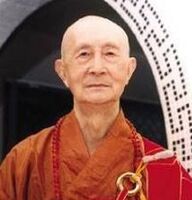Yin Shun
| English Phonetics | Yin Shun |
|---|---|
| Chinese Script | 印順 |
| Birth: | 1906/04/05 |
|---|---|
| Death: | 2005/06/04 |
Tibetan calendar dates
Biographical Information
(Master) Yin Shun (印順導師, Yìnshùn Dǎoshī) (5 April 1906 – 4 June 2005) was a well-known Buddhist monk and scholar in the tradition of Chinese Mahāyāna Buddhism. Though he was particularly trained in the Three Treatise school, he was an advocate of the One Vehicle (or Ekayāna) as the ultimate and universal perspective of Buddhahood for all, and as such included all schools of Buddha Dharma, including the Five Vehicles and the Three Vehicles, within the meaning of the Mahāyāna as the One Vehicle. Yin Shun's research helped bring forth the ideal of "Humanistic" (human-realm) Buddhism, a leading mainstream Buddhist philosophy studied and upheld by many practitioners. His work also regenerated the interests in the long-ignored Āgamas among Chinese Buddhist society and his ideas are echoed by Theravadin teacher Bhikkhu Bodhi. As a contemporary master, he was most popularly known as the mentor of Cheng Yen (Pinyin: Zhengyan), the founder of Tzu-Chi Buddhist Foundation, as well as the teacher to several other prominent monastics.
Although Master Yin Shun is closely associated with the Tzu-Chi Foundation, he has had a decisive influence on others of the new generation of Buddhist monks such as Sheng-yen of Dharma Drum Mountain and Hsing Yun of Fo Guang Shan, who are active in humanitarian aid, social work, environmentalism and academic research as well. He is considered to be one of the most influential figures of Taiwanese Buddhism, having influenced many of the leading Buddhist figures in modern Taiwan. (Source Accessed July 10, 2020)
- Wiki Pages
- Person description or short bio
Expand to see this person's philosophical positions on Buddha-nature.
| Is Buddha-nature considered definitive or provisional? | |
|---|---|
| Position: | |
| Notes: | |
| All beings have Buddha-nature | |
| Position: | |
| If "Qualified", explain: | |
| Notes: | |
| Which Wheel Turning | |
| Position: | |
| Notes: | |
| Yogācāra vs Madhyamaka | |
| Position: | |
| Notes: | |
| Zhentong vs Rangtong | |
| Position: | |
| Notes: | |
| Promotes how many vehicles? | |
| Position: | |
| Notes: | |
| Analytic vs Meditative Tradition | |
| Position: | |
| Notes: | |
| What is Buddha-nature? | |
| Position: | |
| Notes: | |
| Svātantrika (རང་རྒྱུད་) vs Prāsaṅgika (ཐལ་འགྱུར་པ་) | |
| Position: | |
| Notes: | |
| Causal nature of the vajrapāda | |
| Position: | |
